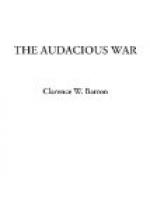Out of this war must arise better international relations, and they comprise not alone the relations of peace, but closer relations to international transportation, as respects both ships, international money, and international credit.
While many people are looking for financial independence between nations, the United States taking back from Europe in the next three years the larger part of the $6,000,000,000 of American securities owned abroad, it is quite possible that the opposite will take place: a greater interrelation, not only in credits but in investments.
If nations are to be more closely knit together hereafter, it will be not alone in alliances of peace, but in financial alliances in security ownership.
It is far better for both Europe and America that, instead of Europe selling its American securities, America should buy European securities—first, acceptances, making a basis for credits and international purchases in connection with the war; and later, American investment in the funds of foreign nations. It may be that before this war is over many European nations will have to appeal to America with their loans.
If France could see her way clear to put out a long-term loan at 5 per cent instead of short-term loans at this rate, there should be a good investment field for it in America.
Russia is an unconquerable country, and her securities at a good rate should be attractive for some American capital.
There is no reason why the 3 per cent bonds of Germany should not soon be investigated for investment purposes in America. The German debt is very small and, however long the war may continue, German bonds will ultimately be paid. They are quoted now at about 70, and, with the discount on exchange, they may be purchased from America at nearly 60, or to get 5 per cent on the investment, to say nothing of possible appreciation toward par in the future.
One may well believe the Germans to be misled in this war, and yet properly await opportunity to purchase at the right time their outstanding national bonds when these can be purchased so much more advantageously toward the end of the war than in the beginning of the era of peace, which must in time follow. Is it not just as neutral to purchase German bonds from the Germans as to purchase ships or our own railroad shares from Germany?
A great and primary lesson for the United States is in a thorough understanding that this war was caused by tariffs. The United States is the home of protective tariffs. The sentiment under a protective tariff is national selfishness. England has bought in other markets wherever she could buy cheapest, and has kept her ports open to the cheapest markets. This may be her selfishness.
It may, however, remain for the United States, while maintaining a protective tariff, to look to larger international relations and admit reciprocal trade-relations. There is a wide field for study here in connection with this war, for the same spirit—the wresting of commercial advantages by tariffs without regard to the fellow nation—is in many countries.




